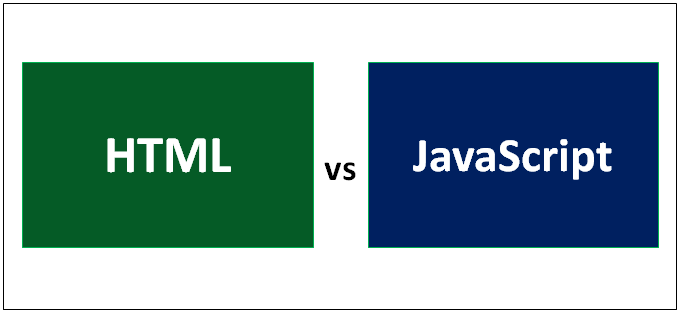These days web development is in high demand due to which a majority of students opt to learn web development. These students are often confused about Javascript vs HTML. So, today we are here with detailed information on the difference between Javascript vs HTML.
Introduction to Javascript
Javascript is a text-based programming language designed primarily for web development, and it is one of the most important technologies for the World Wide Web (WWW). Brendan Eich created Javascript in 1995, and it is managed and standardized by ECMA.
Programmers use Javascript to build dynamic and responsive web components and improve the website’s user interface. Javascript is so widely used for client-side web development that it is used by over 97 percent of all websites on the internet. Javascript is used to create pop-ups, image sliders, site navigation menus, tabs, and form validations, among other things.
Introduction to HTML
HyperText Markup Language (HTML) is the standard markup language used for online pages and apps creation. The webpage structure is described in HTML. From the server, browsers receive HTML pages, which they subsequently render on the screen.
HTML contains a number of elements that inform the browser about the content’s look. For example, the <p> tag specifies a paragraph, the <title> tag defines the web document’s title, the <body> tag defines the visible content of page, the <table> tag defines a table, and so on. HTML allows scripting languages, such as JS, to be embedded in web pages, affecting their content and behavior. Furthermore, CSS (Cascading Style Sheet) may be used to improve the layout and appearance of the web page.
Javascript vs HTML: The Main Differences
The main differences between Javascript and HTML are as follows-
Syntax
HTML stands for Hypertext Markup Language. It has several tags, such as picture tags, table tags, line break tags, header tags, etc., which all are included. Javascript offers a variety of capabilities that make a web page interactive and dynamic, and HTML syntax is less difficult to learn and comprehend. In comparison to HTML, Javascript is a more complex language.
Dynamic Programming
A webpage becomes dynamic when Javascript is used. It has the ability to modify the values and properties of HTML tags in response to user activities. It’s primarily used in HTML coding to create interactive web pages.
In contrast, HTML cannot create a dynamic web page by itself. As a result, dynamic changes to the code are not possible. To create dynamic web pages, programmers can incorporate Javascript in HTML code.
Compatibility
One of the most important factors when comparing Javascript vs HTML is compatibility. HTML is supported by all browsers. Every browser can render its tags without any problems. However, Javascript isn’t always supported by all browsers.
For instance, some Javascript functionalities run fine in Chrome and Firefox but not in Internet Explorer. Due to this, some websites include a list of compatible browsers to guarantee that the webpage is shown correctly in the client’s browser.
Client-Side and Server-Side Web Development
The client-side of a webpage is coded in HTML. It cannot be used by programmers to write server-side programs. Javascript, on the other hand, may be used on both the client and server sides of a website.
SSJS (Server-side Javascript) is a more advanced variant of core Javascript.
For instance, NodeJS is an open-source, cross-platform Javascript runtime environment that enables programmers to write server-side programs in Javascript. With the aid of NodeJS, Javascript code may execute outside of the browser.
Javascript vs HTML: Comparison Table
| Javascript | HTML |
| JavaScript is a high-level programming language, and it runs on the client-side of the web browser. | HTML is the most fundamental component of the Internet, and it establishes the structure and meaning of web content. |
| JavaScript is a powerful programming language that enhances the interactivity and dynamic nature of online sites. | HTML is a markup language that is used to create the basic structure of a website. |
| JavaScript simply enhances the appearance of web pages by adding dynamic content. | HTML work on the website’s appearance, but without the interactive effects. |
| It creates dynamic web pages by manipulating content. | The content of HTML pages is static, which means it cannot be altered. |
| It improves the appearance of web pages by adding interactivity. | It establishes the fundamental structure of a web page. |
| To create the web pages dynamically, Javascript is used. | HTML is rendered entirely on the server, as opposed to client-side programming. |
| JavaScript isn’t supported by all browsers | HTML is supported by all browsers |
| JavaScript is a scripting language that may be embedded in HTML. | JavaScript does not allow HTML to be embedded. |
Conclusion
Hopefully, you got the information regarding Javascript vs HTML from this blog. For static web content, the HTML language is used, whereas the JavaScript language is utilized for dynamic web pages. HTML is used to display content, but JavaScript is used to provide an interactive environment for users to engage with web content. To enhance the web page’s content display, the HTML has no supporting libraries whereas Javascript has libraries such as ReactJS, Angular JS, etc.
